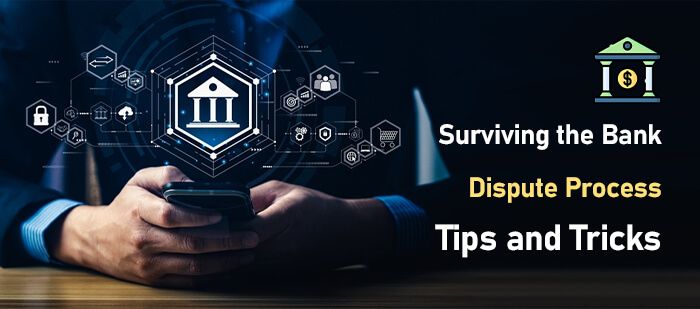
Have you ever found an unauthorized charge on your bank statement or been a victim of fraud. Dealing with a bank dispute process can be stressful and time-consuming. But with the right knowledge and preparation, you can navigate the process successfully. In this blog post, we will provide you with tips and tricks for surviving the Bank Dispute Process.
Understanding the Bank Dispute Process
Navigating the waters of a bank dispute can seem daunting at first. But grasping the basic framework of the process can illuminate your path to resolution. Initially, identifying the issue is paramount—be it an unauthorized charge, a billing error, or fraudulent activity on your account. The next step involves formally notifying your bank of the discrepancy.
This is typically done through a written notice, allowing the bank to begin its investigation into the matter. During this time, it’s crucial to understand your rights as a consumer. Including any provisional credits you may be entitled to while the dispute is being resolved.
Each bank may have its own set of procedures and timelines for handling disputes. Making it vital to familiarize yourself with your bank’s specific process. This understanding ensures that you can effectively navigate through the necessary steps, from initial report to resolution, and advocate for yourself throughout the process.
Some Related Blogs
- Why Your Business Needs Chargeback Insurance Today
- How to Effectively Handle a Stripe Chargeback
- Understanding the Essentials of Chargeback Protection
- The Benefits of Using a Chargeback Manager for E-commerce
Gathering Necessary Documentation
Embarking on the bank dispute journey necessitates a meticulous approach to documentation. It’s paramount to compile a robust dossier that substantiates your claim. This dossier should encompass an array of evidence including, but not limited to, detailed bank statements pinpointing the transaction in question, pertinent receipts that showcase the transaction’s legitimacy or discrepancy, comprehensive invoices that align with your claim, and any correspondence between you and the merchant that sheds light on the dispute.
Equally important is the assembly of any contractual agreements or terms of service that might influence the nature of the dispute. In some cases, screenshots or digital records that illustrate the transaction or any anomalies experienced during the transaction can serve as powerful pieces of evidence.
Ensuring that each piece of documentation is clear, legible, and directly relevant to your dispute will solidify your position and aid the bank in conducting a thorough and expedient investigation. It is this level of preparedness and attention to detail that significantly bolsters your case, paving the way for a potentially favorable resolution. Remember, the goal is to present a coherent and compelling narrative that leaves little room for doubt regarding the validity of your dispute.
Reporting the Dispute to Your Bank
Initiating contact with your financial institution is a pivotal step in the bank dispute process. When you’re ready to report the issue. It’s critical to adhere to your bank’s prescribed protocols for filing disputes. This often means completing specific forms provided by the bank, either online or in person, and submitting your compiled dossier of supporting documentation. Detail is key—clearly articulate the nature of the dispute. Including transaction details such as the date, amount, and the merchant’s name. Some banks may also require a detailed written explanation of the dispute and why the charge is considered incorrect or fraudulent.
![]()
Email us anytime!
Email customer service 24/7
![]()
Call us anytime!
Reach customer care 24/7 at +1 (888) 901-8653
It’s essential to use clear, concise language and stick to the facts, as this will aid your bank in understanding the issue and expedite the investigation. Directly after your report, make a note of any reference numbers or confirmation details provided by the bank; these will be invaluable for future communications and follow-ups regarding your case. Remember, prompt action on your part can play a significant role in the effectiveness and speed of the dispute resolution process.
What Happens After You File a Dispute?
Once your dispute is officially on record with your bank, a detailed investigation kicks off. This phase is crucial, as it involves your bank meticulously examining the evidence you’ve provided against the transaction in question. The duration of this inquiry can vary, generally spanning a few weeks. During this interval, you might notice that your account is provisionally credited for the disputed sum. This temporary credit acts as a placeholder, ensuring that your finances are not unduly affected while the dispute is actively reviewed.
During the investigation, your role shifts to one of support and cooperation. Your bank may reach out for additional documentation or clarification regarding the dispute. It’s imperative to respond swiftly and accurately to these requests, as they are critical for advancing the investigation. The bank’s goal is to ascertain the legitimacy of the dispute, which sometimes involves contacting the merchant involved in the transaction.
As this process unfolds, monitoring your account for updates is wise. Any changes or updates regarding the dispute will be communicated by the bank. But staying on top of these communications ensures you are not caught off guard by any developments. Engaging proactively with your bank during this time not only demonstrates your vested interest in resolving the dispute but can also facilitate a more efficient investigation.


